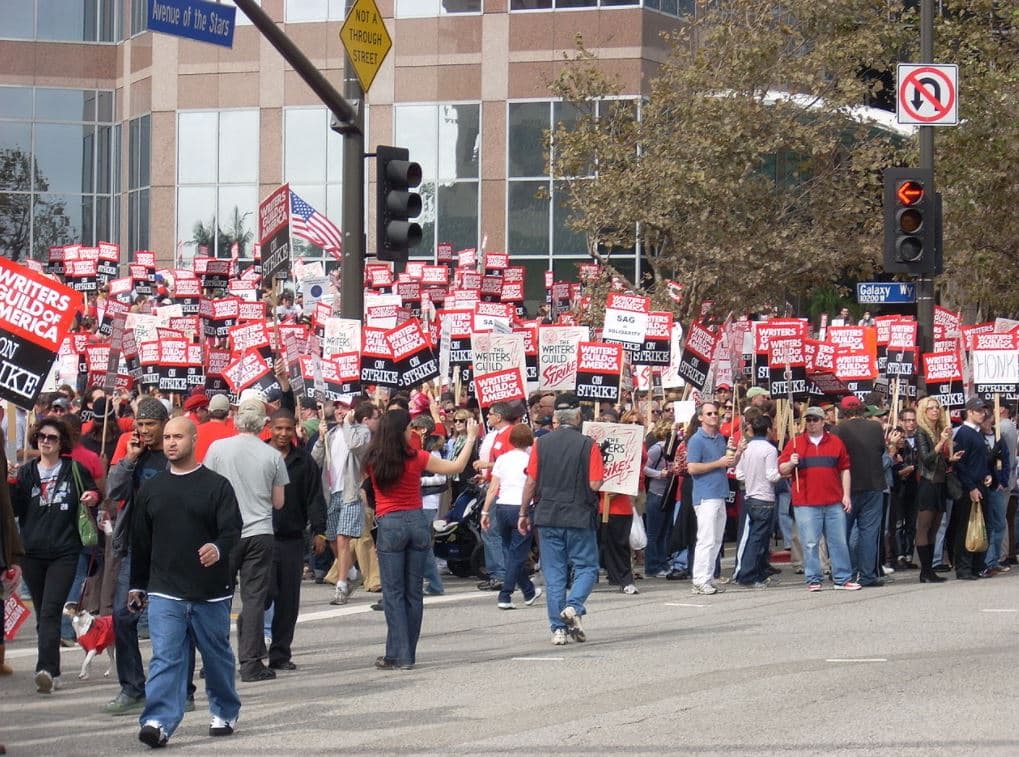Looming Strikes Threaten to Shut Down Most US Film and Television Production

LOS ANGELES, Calif. – It could be the biggest labor action in Hollywood since a Writers Guild of America strike crippled the entertainment industry for some 14 weeks in late 2007 and early 2008.
Beginning next week, members of the International Association of Theatrical Stage Employees will be asked via secret ballot to decide whether to authorize a strike against motion picture and television producers.
If the union does go out on strike, some 60,000 IATSE members will walk off the job. While most of the film and television industry workers are based in Los Angeles, because of the nature of IATSE locals, classifying them as national entities, a strike would shut down television and production across the U.S.
While the war of words has been vitriolic for weeks, the odds of a punishing strike increased substantially Friday, when the heads of the other major entertainment unions — the Directors Guild of America, SAG-AFTRA, the Writers Guild of America and the Teamsters — issued a joint statement of solidarity with the IATSE colleagues.
“On behalf of our hundreds of thousands of members working across film and television, we stand in solidarity with our I.A.T.S.E. brothers, sisters and kin,” the joint statement said. “The basic quality of life and living wage rights they’re fighting for in their negotiations are the issues that impact all of us who work on sets and productions. We stand with the I.A.T.S.E.”
The most recent Hollywood Basic Agreement, the dominant collective bargaining agreement between Hollywood producers and IATSE workers, expired on July 31, but was extended to September 10 to allow the union to continue talks with the Alliance of Motion Picture and Television Producers.
Among the issues the IATSE has identified are a lack of adequate rest for its members during shoots, the need for a cost-of-living raise and what it describes as “sustainable” benefits and an acknowledgement of the need for diversity, equity and inclusion.
In regard to the latter, the union wants the birthday of Martin Luther King, Jr. holiday in January to be a mandatory day off for its members.
Earlier this month, the talks fell apart.
Within hours, the two sides released dueling statements.
According to IATSE, its leadership is committed to demanding more humane working conditions across the industry, equitable pay on streaming productions — claiming old agreements on “new” media are now out of date, and “a livable wage floor.”
As for the Alliance of Motion Picture and Television Producers, it contends it offered the union a “comprehensive proposal that meaningfully addresses the IATSE’s key bargaining issues.”
By leaving the bargaining table, the producers say, “IATSE leadership walked away from a generous comprehensive package.”
In its notice of the impending strike vote, IATSE President Matthew Loeb and the negotiating committee explained that what they are seeking is simply the authority to call a strike if they determine it’s the only way to get the producers back to the negotiating table.
“Remember, by saying yes to authorizing a strike, that does not mean that a strike will be called,” they remind their members. “That depends on how the producers respond to our continued desire to negotiate.”
Of course, if the strike is called, the average movie and television viewer might initially wonder why they’re still seeing new shows on HBO, Showtime and Starz, as well as new television commercials and music videos.
That’s because while the Hollywood Basic Agreement covers the vast majority of productions, IATSE actually has separate contracts with entities other than the Alliance of Motion Picture and Television Producers.
For instance, IATSE’s current pay television agreement with the likes of HBO, Cinemax and BET, among others, does not expire until December 31, 2022.
Another separate agreement, covering pay TV, low-budget theatrical releases, one-off productions and music videos, also expires on the last day of 2022, while a third agreement, with the Association of Independent Commercial Producers runs through September 30, 2022.
IATSE has told members covered by those agreements that no matter what happens with the strike vote, they must keep working.
“You will not be a scab,” the union said in a notice to those members.
























